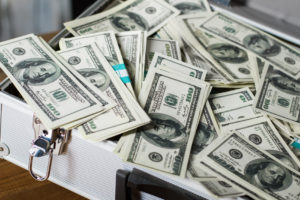 When I was six years old, and taking guitar lessons for about six months, my music school arranged a big (“giant” to a six year old) concert at a plush Long Beach Hotel around 1963. I was playing The Yellow Rose of Texas with about twenty other guitarists and assorted band members. The guitarists were to play the lead (I was a lead guitarist) until the violinist’s solo part. At that point we were supposed to stop playing…I didn’t. How did I know? Because they were recording us, and it came out on the 33 RPM vinyl album. Yep. The highlight of the song during the violinist solo was interrupted by note here and there by a six year old who played in a daze.
When I was six years old, and taking guitar lessons for about six months, my music school arranged a big (“giant” to a six year old) concert at a plush Long Beach Hotel around 1963. I was playing The Yellow Rose of Texas with about twenty other guitarists and assorted band members. The guitarists were to play the lead (I was a lead guitarist) until the violinist’s solo part. At that point we were supposed to stop playing…I didn’t. How did I know? Because they were recording us, and it came out on the 33 RPM vinyl album. Yep. The highlight of the song during the violinist solo was interrupted by note here and there by a six year old who played in a daze.
The interesting thing was nobody talked music royalties. Surely they were going to sell our album. It didn’t matter, all I wanted to do was play.
Sometimes musicians that I work for have the same opinion. They don’t care about music royalties very much, they just want to play their music.
You don’t have to be a music attorney to know the basics of music royalties. In addition to the web, there are a couple of books that can help you: Music Money and Success by Jeffrey and Todd Brabec, and All You Need to Know About the Music Business by Donald S Passman. Both these books are excellent sources in learning about the different types of music royalties like writer’s royalties and publishing royalties.
However, there are online sources that can inform you about some of the latest royalty streams like Brain Tarquin’s article at Music Connection, Get Paid, Alternative Royalties for Indie Artists. Brian discusses the different royalty streams that have emerged with later technology like satellite and cable TV. Organizations like Soundexchange, LTVSMF, and SENA are explained in his article.
I have personally dealt with SoundExchange for years and have found a reasonable royalty stream for my clients. Any possible money left on the table is worth the effort of contacting them.
SoundExchange didn’t have any royalties for me on my Yellow Rose of Texas debut. Maybe next year.

 It worked for Disneyland in their haunted mansion, but will it work for you?
It worked for Disneyland in their haunted mansion, but will it work for you?
 Abraham Maslow stated in 1966, that if the only tool you have is a hammer, you would be tempted to treat everything as a nail.
Abraham Maslow stated in 1966, that if the only tool you have is a hammer, you would be tempted to treat everything as a nail. Sometimes the hardest part about struggling to reach your dream are the people around you. Dreama’s article,
Sometimes the hardest part about struggling to reach your dream are the people around you. Dreama’s article,  When I started playing guitar in the early 1960s, nobody played “air guitar.” Those who didn’t want to play, didn’t, and those who wanted to play guitar copied Jimmy Hendricks, Chuck Berry, and many others in the entertainment industry.
When I started playing guitar in the early 1960s, nobody played “air guitar.” Those who didn’t want to play, didn’t, and those who wanted to play guitar copied Jimmy Hendricks, Chuck Berry, and many others in the entertainment industry. I remember about six years ago when a relatively unknown organization, Soundexchange, contacted us (CPA entertainment business managers) about signing up one of our music artist clients. They said that our client was not collecting all music royalties through ASCAP, UMG, EMI, etc. Instead, there were an increasing amount of royalties being left on the table from certain digital transmissions like streaming.
I remember about six years ago when a relatively unknown organization, Soundexchange, contacted us (CPA entertainment business managers) about signing up one of our music artist clients. They said that our client was not collecting all music royalties through ASCAP, UMG, EMI, etc. Instead, there were an increasing amount of royalties being left on the table from certain digital transmissions like streaming. As an Entertainment CPA, I find my clients are not short of creativity. Every year, clients retain us to create a business (and sometimes a strategic) plan for an entertainment industry venture. Usually they google Entertainment CPA, or Business Manager CPA, or Strategic Planning Entertainment CPA, and find us. However, we convince them that our role is not just as a mere number cruncher, but an integral part of developing the concept.
As an Entertainment CPA, I find my clients are not short of creativity. Every year, clients retain us to create a business (and sometimes a strategic) plan for an entertainment industry venture. Usually they google Entertainment CPA, or Business Manager CPA, or Strategic Planning Entertainment CPA, and find us. However, we convince them that our role is not just as a mere number cruncher, but an integral part of developing the concept. I was twenty-one in 1978 when I got my first part-time CPA accounting job while studying at UCLA. The adding machine I used had a crank…really.
I was twenty-one in 1978 when I got my first part-time CPA accounting job while studying at UCLA. The adding machine I used had a crank…really. My father sang rockabilly in the 1950s under contract with Capitol Records. (
My father sang rockabilly in the 1950s under contract with Capitol Records. ( Tomorrow, as a Los Angeles CPA business manager, I will be merging two of my skills with a client. My entertainment business management skills, and my strategic planning skills. This client is a singer/songwriter who produced a music demo and video. My question to her was, “So what?” If you pursue the path of other musicians to acquire a contract, a 360 deal, you are no better than them, and may be just one of many homogeneous artists trying to make it.
Tomorrow, as a Los Angeles CPA business manager, I will be merging two of my skills with a client. My entertainment business management skills, and my strategic planning skills. This client is a singer/songwriter who produced a music demo and video. My question to her was, “So what?” If you pursue the path of other musicians to acquire a contract, a 360 deal, you are no better than them, and may be just one of many homogeneous artists trying to make it.